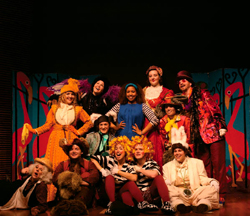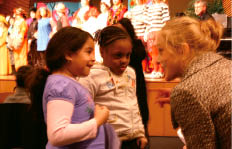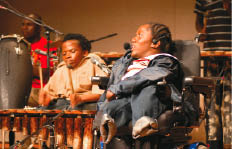Curtain Up!
TC's Performing Arts Series brings local school children to campus for live music and theater. They leave singing in the street
Few in the TC community can forget the day last year when the Zimbabwean band Liyana rocked the Cowin Conference Center with its powerful Afro-fusion sound. Children came from schools across New York City to hear Liyana play two performances. They stood at their seats to dance, clap and sing along.
Liyana’s concert also inspired Emily Zemke, Associate Director of TC’s Office of School and Community Partnerships, to create an ongoing series of live performances at TC for children from local public schools.
Liyana’s energetic act includes nine young musicians with severe disabilities who started playing together as teenagers. They make their own instruments to accommodate their physical challenges. The band’s unique sound combines gospel, reggae and traditional Shona music with vocals, marimbas, drums and keyboard, all fronted by the high, clear voice of Prudence Mabhena, who performs in a wheelchair.
Liyana’s visit was first proposed in summer 2008, when the College received a call from Deborah Briggs, Executive Director of the PG Foundation, who holds a doctorate of arts in education from TC. Briggs was managing the inaugural U.S. tour of the young Zimbabwean band and wondered if her alma mater would host a performance.
Zemke, who has a self-professed “passion for the arts,” collaborated with Briggs and a team of faculty and students to coordinate the live performances in the Cowin Center for some 1,000 students and 100 teachers from 13 neighborhood schools. Another 17 schools across the city watched the performances through a live stream over the Internet. The day at TC would be featured in a film about Liyana’s U.S. tour, Music by Prudence, which later won an Academy Award for best short documentary.
Liyana and its members would also have a lasting impact at TC. “The feedback from children and teachers was overwhelming,” Zemke recalls. “They said the performance had really touched them, and even changed their lives.
“We realized that we could do more of these on-campus experiences for schools in our neighborhood,” she says. “Children’s exposure to live arts is declining because of the emphasis on tests and core subjects, and there are many children on our own doorstep who rarely, if ever, experience live performances.”
Zemke had a head start with the program. ArtsPower National Touring Theatre had already approached her about bringing a performance to campus. She contacted Mark Blackman, founding co-director (whose father, the pioneering psychologist and researcher Leonard Blackman, is a TC emeritus faculty member), and arranged for the company to perform “My Heart in a Suitcase,” a story about Kindertransport, the rescue of Jewish children from Nazi Germany.
Zemke also reached out to the Manhattan School of Music, TC’s neighbor to the north, which brought its performance of “A Bel Canto Cricket in Times Square,” written by its Discover Opera! student group. With those two performances last spring, plus the Liyana show, the office brought 2,000 public school students to campus along with their teachers and reached many more through online footage.
This spring the performance series has expanded to four events, all in the Cowin Center. On March 25 and 26, Discover Opera! staged “Alice in Operaland,” the Manhattan School of Music brought its jazz band for a performance of “Get Into the Groove” on April 8, and on May 19, ArtsPower was slated to return to campus with a performance of “From the Mixed-Up Files of Mrs. Basil E. Frankweiler.” For each performance, a small team of TC students has created pre- and post-performance mini-lesson plans to help teachers integrate the themes and concepts of the performances into their classroom work.
Zemke sees the series as another way in which TC can be a good neighbor to the city’s public schools and broaden both the academic and cultural experiences of children from high-poverty, predominantly immigrant neighborhoods.
There is a solid educational component as well. Zemke cites research showing that exposure to live performance enhances children’s reading skills, attention, information processing and ability to empathize. A 1999 study by faculty members Judith Burton, Chair of the Arts and Humanities Department, Robert Horowitz, Associate Director of the Center for Arts Education Research, and Hal Abeles, Professor of Music Education, went even farther in finding that studying the arts helps students develop a “rich array of complex cognitive abilities.”
Children who visit TC also experience the College as a welcoming place. ”The campus visits encourage them to form positive and personal impressions about higher education,” Zemke says. “They leave here singing in the street.”
Published Thursday, May. 20, 2010


